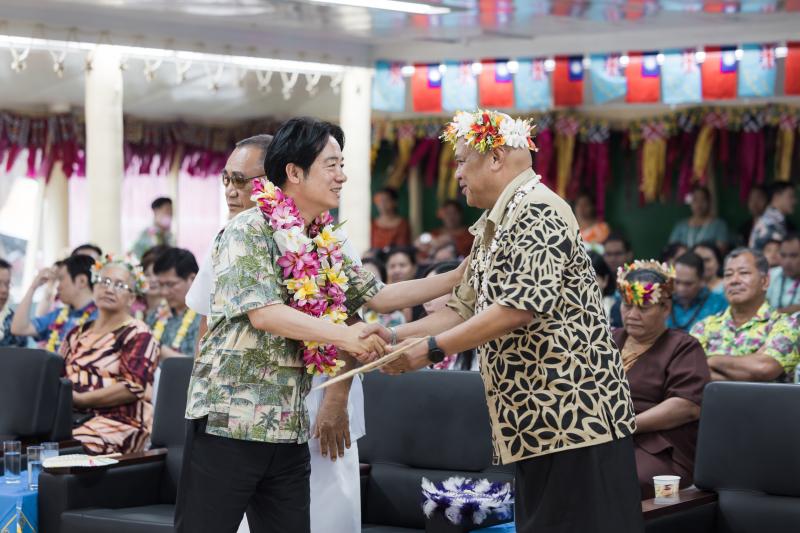President William Lai (賴清德) arrived in the Pacific nation of Tuvalu today, where the two nations signed a joint communique on advancing their partnership.
Lai's day trip to Tuvalu came just ahead of a stopover in the US territory of Guam.

Photo courtesy of the Presidential Office
Earlier, he was in the Marshall Islands where President Hilda Heine expressed her government's commitment to "remain a staunch ally" of Taiwan.
Tuvalu and the Marshall Islands are among 12 nations that still recognize Taiwan diplomatically.
Lai smiled and waved as he stepped off the plane in Tuvalu, where he was greeted by Prime Minister Feleti Teo, Governor General Tofiga Vaevalu Falani, schoolchildren, an honor guard, and a traditional song and dance performance.
"When I disembarked and saw Tuvaluan students waving the national flags of our two countries, I strongly felt the people's firm commitment to our diplomatic alliance," Lai said through a translator.
Looking relaxed in a colorful shirt and a garland of pink and yellow flowers around his neck, Lai said he hoped Taiwan and Tuvalu can "expand our cooperation to even more areas, thereby further strengthening our diplomatic partnership."
In a speech, Teo expressed "Tuvalu's thanks for Taiwan's contribution" to a pool of funds used by the government to buy a submarine Internet cable, as well as its financial support for climate action.
In a joint communique on "advancing the comprehensive partnership" signed during Lai's visit, Taiwan and Tuvalu agreed to "reassess the ongoing bilateral cooperation projects in order to establish a more durable, lasting and mutually beneficial diplomatic relations."
Teo was named prime minister in February, a month after an election that put the nation's recognition of Taiwan in question.
During the election campaign, senior lawmaker Seve Paeniu had floated the idea that Tuvalu's new government could review its Taiwan ties.
That set off frenzied speculation about a looming shift in policy, but the new government has vowed to keep up its "special" relationship with Taiwan.
China has dramatically ramped up its efforts to gain influence across the Pacific islands in recent years, lavishing small nation states with loans, investment, security aid and other enticements.
Beijing has already poached some of Taiwan's Pacific allies, convincing Solomon Islands and Kiribati to switch recognition in 2019.
Neighboring Nauru severed diplomatic ties with Taiwan in January, just days after Lai won the presidential election.
Lai is to wrap up his week-long trip on Friday with a visit to ally Palau.

Right-wing political scientist Laura Fernandez on Sunday won Costa Rica’s presidential election by a landslide, after promising to crack down on rising violence linked to the cocaine trade. Fernandez’s nearest rival, economist Alvaro Ramos, conceded defeat as results showed the ruling party far exceeding the threshold of 40 percent needed to avoid a runoff. With 94 percent of polling stations counted, the political heir of outgoing Costa Rican President Rodrigo Chaves had captured 48.3 percent of the vote compared with Ramos’ 33.4 percent, the Supreme Electoral Tribunal said. As soon as the first results were announced, members of Fernandez’s Sovereign People’s Party

MORE RESPONSIBILITY: Draftees would be expected to fight alongside professional soldiers, likely requiring the transformation of some training brigades into combat units The armed forces are to start incorporating new conscripts into combined arms brigades this year to enhance combat readiness, the Executive Yuan’s latest policy report said. The new policy would affect Taiwanese men entering the military for their compulsory service, which was extended to one year under reforms by then-president Tsai Ing-wen (蔡英文) in 2022. The conscripts would be trained to operate machine guns, uncrewed aerial vehicles, anti-tank guided missile launchers and Stinger air defense systems, the report said, adding that the basic training would be lengthened to eight weeks. After basic training, conscripts would be sorted into infantry battalions that would take

EMERGING FIELDS: The Chinese president said that the two countries would explore cooperation in green technology, the digital economy and artificial intelligence Chinese President Xi Jinping (習近平) yesterday called for an “equal and orderly multipolar world” in the face of “unilateral bullying,” in an apparent jab at the US. Xi was speaking during talks in Beijing with Uruguayan President Yamandu Orsi, the first South American leader to visit China since US special forces captured then-Venezuelan president Nicolas Maduro last month — an operation that Beijing condemned as a violation of sovereignty. Orsi follows a slew of leaders to have visited China seeking to boost ties with the world’s second-largest economy to hedge against US President Donald Trump’s increasingly unpredictable administration. “The international situation is fraught

GROWING AMBITIONS: The scale and tempo of the operations show that the Strait has become the core theater for China to expand its security interests, the report said Chinese military aircraft incursions around Taiwan have surged nearly 15-fold over the past five years, according to a report released yesterday by the Democratic Progressive Party’s (DPP) Department of China Affairs. Sorties in the Taiwan Strait were previously irregular, totaling 380 in 2020, but have since evolved into routine operations, the report showed. “This demonstrates that the Taiwan Strait has become both the starting point and testing ground for Beijing’s expansionist ambitions,” it said. Driven by military expansionism, China is systematically pursuing actions aimed at altering the regional “status quo,” the department said, adding that Taiwan represents the most critical link in China’s